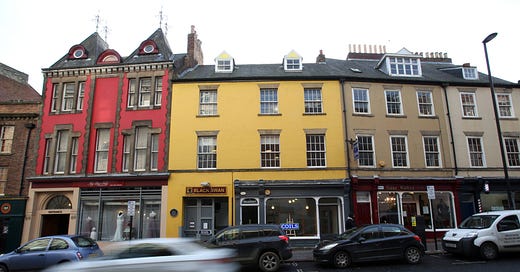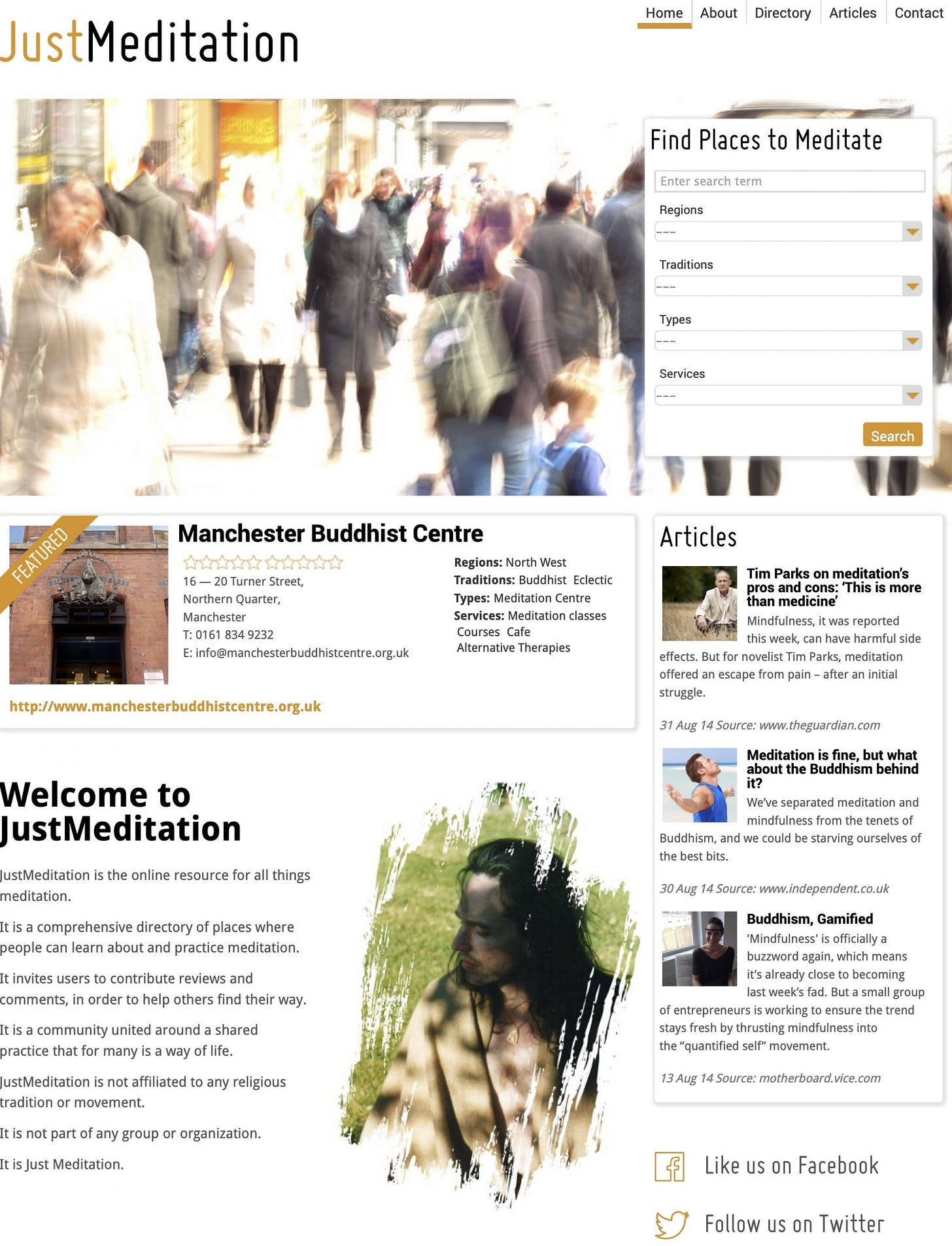The Newcastle Meditation Centre
The (short) story of the UK's first independent high street meditation centre (2016-2020)
Between 2016–2020, the Newcastle Meditation Centre, at the bottom of Westgate Road in Newcastle city centre, provided a safe, welcoming and ideologically neutral space – wholly dedicated to the learning and practice of mindfulness and meditation.
It was the first independent high street meditation centre in the UK, and it existed to make the benefits of meditation accessible, affordable and available to all.
During those four years, before the 2020 coronavirus pandemic forced it to close, the Meditation Centre offered weekly drop-in sessions, as well as a wide range of courses and workshops on a variety of topics related to mindfulness and meditation, together with a number of other activities, including research seminars, discussion groups and social events. The space was also hired by groups and individuals for their own meditation-related pursuits.
How did it all begin?
Shortly after moving to Newcastle in 2012 I met Ollie Batchelor, who was at that time a senior executive in the charity sector. We began a conversation about religion, spirituality, addiction and recovery, that eventually grew into the idea of organising some sort of meditation workshop for a group of people we thought might be interested.
On 12 October 2013, I led a two-hour meditation workshop at the Recovery Centre on the Quayside, attended by about a dozen people. Although it was only intended as a one-off event, when everyone started asking when the next session was going to be, we quickly decided to make it a regular monthly meeting.
Over the next three years, the group continued to grow and flourish, necessitating a move to larger premises. The meetings were never advertised – people just heard about it by word of mouth – but we were often over subscribed. Clearly there was something about what we were doing, and perhaps also the way we were doing it, that was tapping into a genuine need.
The format of the sessions was kept deliberately simple. I always made a point of trying to explain things without using jargon, and – most importantly of all – there was no requirement to buy into any kind of belief system. For some time I had been thinking that there was a need for somewhere that people could go to learn and practice meditation that wasn’t linked to any kind of religious organisation: an independent high street meditation centre.
In January 2014, after a quick trawl of internet domain names, the idea of Just Meditation was born.
The first incarnation of Just Meditation was an internet directory of places where people could go to learn or practice meditation, with a database that was searchable by postcode, region, tradition or activities, and the facility for people to leave reviews and comments.
It launched in August 2014 with about 200 entries. But it was hard to maintain, difficult to promote and fraught with technical issues. It never really took off, and a year later it was closed. But the idea of trying to set up an actual centre just wouldn’t go away.
There must have been something in the air at that time, because it turned out that I wasn’t the only one thinking along these lines and coming to similar conclusions. In April 2014, a place called Unplug, claiming to be the word’s first secular drop in meditation studio, opened in Los Angeles. The following year a similar venture called MNDFL opened in New York. Since then, secular meditation centres seem to have mushroomed all over the United States.
Interestingly, they all tend to look and feel rather similar, like a western Buddhist centre without the Buddhist bits – and they also seem to be pitched at the more commercial end of the wellbeing industry. These are places that are clearly aimed at a fairly specific demographic – young, white, urban, professional and almost exclusively female – thus reinforcing all the prevailing stereotypes of yoga and meditation as part of an eclectic smorgasbord of middle class lifestyle choices.
That alone marked what we were doing in Newcastle as something quite unique. Our attendees represented a diverse balance of men and women of all ages and backgrounds, including people in recovery from addictions, or grappling with PTSD or other mental health issues, ex-offenders, Buddhists, Christians, atheists – all were welcome, and all were able to share the practice together.
Inevitably, it was only a matter of time before something similar to what had been happening in the United States would emerge in the UK. Sure enough, a little over a year after the Newcastle Meditation Centre opened, a place heralded in the media as London’s first meditation studio, called Re:Mind – very much a carbon-copy of the American model and aimed squarely at the same sort of clientele – opened on 19 February 2018.
Why did we do it?
There are, of course, lots of places to learn or practise meditation, such as Buddhist groups, retreat centres and even churches, but generally they are part of some other – usually religious – organisation. And whilst many of these are located in towns and cities, there is still a sense that to do it ‘properly’ you need to go away on retreat somewhere. This is all very well, but the fact is not everybody has the time or resources to do that.
The concept of Just Meditation, and the meditation centre, was therefore driven by two key principles. First, it had to be inclusive; that is, completely independent and ideologically neutral. Just Meditation neither belongs to nor promotes any particular tradition or teaching: it is just meditation. And secondly, it had to be accessible: on the high street and at the heart of everyday life.
Running the Centre was hard work. We were doing something completely new, we had no capital, and our intention to run it as a charity meant that we were constantly struggling to make ends meet. But there was something wonderful about that as well. The place was entirely run by volunteers, ably managed from 2018 onwards by Joana. All the drop-in sessions were led by people I had trained and supported in facilitating meditation sessions in the Just Meditation style. And we had a growing network of mindfulness practitioners delivering paid courses and workshops that was starting to generate a decent revenue stream.
By the time the Centre closed there were daily courses and activities, a vibrant group of volunteers and a large number of committed participants. But in spite of all this positive growth, the finances were still precarious and we simply couldn’t survive the period of extended shutdown caused by the 2020 coronavirus pandemic.
However, every ending is a new beginning, and the work of Just Meditation continues – still true to its foundational principles – albeit in a new form.
If you have any memories about the Meditation Centre that you would like to share, please add a comment below.







